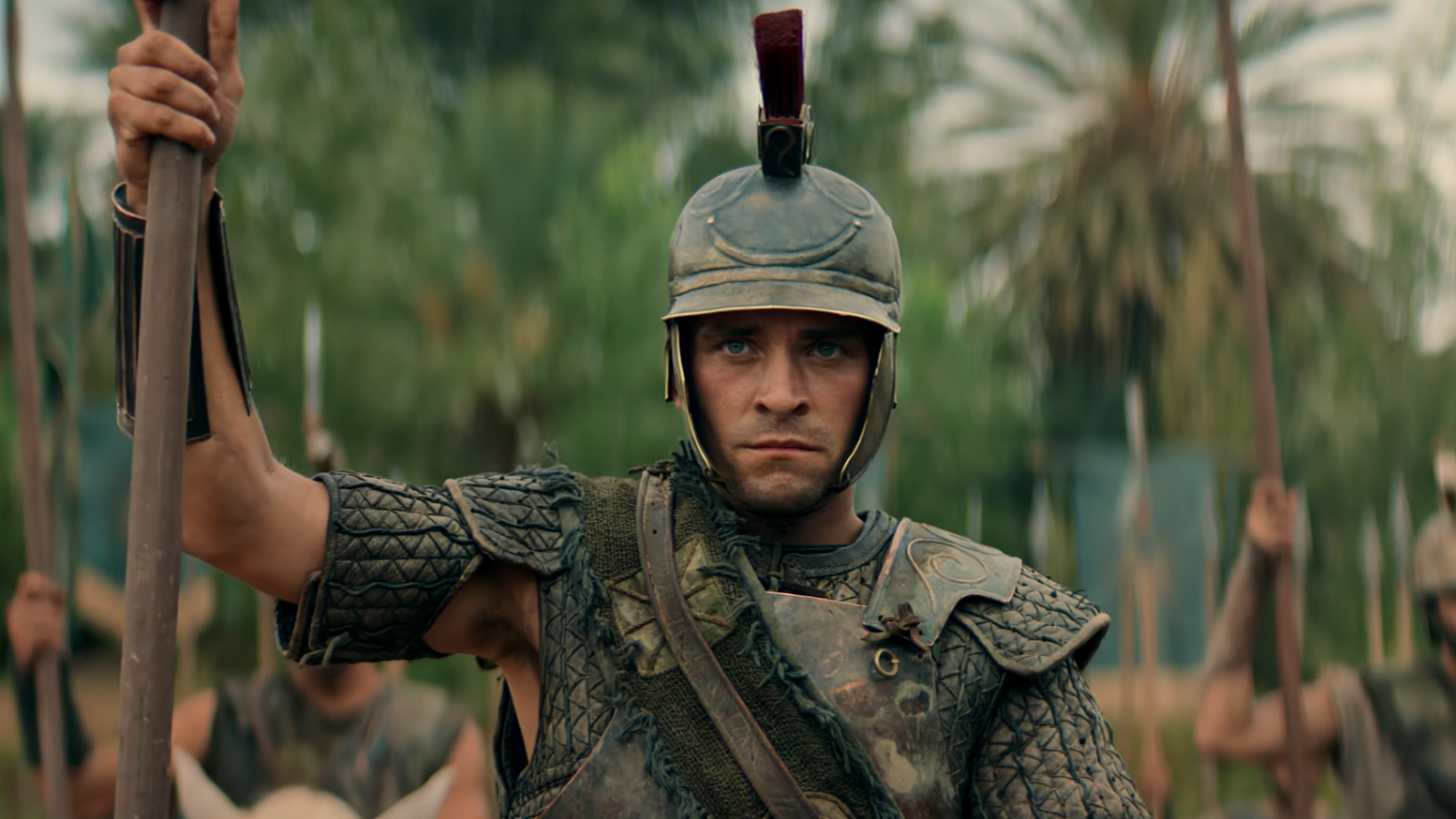Alexander: The Making of a God episode 2 recap: A crucial victory
What happened in Alexander: The Making of a God episode 2?

The latest updates, reviews and unmissable series to watch and more!
You are now subscribed
Your newsletter sign-up was successful
Want to add more newsletters?

ONCE A WEEK
What to Watch
Get all the latest TV news and movie reviews, streaming recommendations and exclusive interviews sent directly to your inbox each week in a newsletter put together by our experts just for you.

ONCE A WEEK
What to Watch Soapbox
Sign up to our new soap newsletter to get all the latest news, spoilers and gossip from the biggest US soaps sent straight to your inbox… so you never miss a moment of the drama!
Alexander: The Making of a God episode 2 is the second chapter in Netflix's docudrama. Starring Buck Braithwaite in the title role, the docudrama combines expert insights with dramatic reenactments from Alexander's life, charting his war with the Persian Empire.
Episode 2 deals with the early parts of Alexander's invasion. Needing to prove himself a worthwhile leader (and a serious threat to Persia), it shows how he claimed victory during the Battle of the Granicus. Do note that Alexander features both expert commentary and dramatized reenactments of Alexander's life, so what we've described below is just what appeared in the show.
The invasion begins
Having quashed any threats to his reign, Alexander sets off with his forces (32,000 infantry, 5,000 cavalrymen) in the Spring of 334 BCE. After 22 days of marching from the Macedonian capital of Aegae, they land at the Hellespont, a stretch of sea marking the division between Europe and Asia. There, he merges with General Parmenion's remaining forces (which had been depleted during earlier skirmishes with the Persians).
As our experts explain, Alexander knows he has to prove himself in order to secure his soldiers' loyalty and to demonstrate the campaign against such a large empire is worthwhile. But he does something weird when he lands. Aware he needs to have the gods on his side, Alexander heads on a 'sightseeing tour', exploring the world of Achilles, one of the great Greek heroes.
In Babylon, Darius learns that Alexander and his troops have landed at Hellespont from General Memnon. The General suggests they could devastate Alexander's forces by cutting off supply lines and burning their crops, but Darius refuses as he wants to 'make an example' of Alexander to the rest of Persia. He sends Memnon to deal with him once and for all.
Alexander's first act is not of war, but of pilgrimage; he travels with Hephaestion to the the temple at Troy, wherein he retrieves the armor of Achilles to wear in battle; in another clip, he reveals to Hephaestion that he's a son of Zeus (according to Olympias), and his companion in turn pledges loyalty and states that his people need a hero on the battlefield.
Alexander leads his men to the River Granicus, a journey which would have probably taken about a month. Persian forces (40,000 men, including 5,000 Greek mercenaries) meet them there, led by Memnon, the same man who forced the Macedonians back at Magnesia.
The latest updates, reviews and unmissable series to watch and more!
With the battle on the horizon, Alexander tries a new tactic: an immediate surprise attack. Parmenion and Ptolemy advise him to regroup and attack in the morning, but Alexander orders the troops to be mobilized immediately. an attack; Parmenion is to attack from the left flank, whilst Alexander drives through the center.
The Battle of the Granicus
The two opposing forces line up on opposite sides of the Granicus. Darius' troops were prepared for an early battle the following morning, but Alexander led a charge there and then, attacking the Persian cavalry and their Greek infantry. The Macedonian cavalry manages to punch through the Persian line, in an attack that would have been unlike what they'd experienced in other battles.
We're told Memnon was thrown by his bizarre tactic, and that Alexander's speed allowed his forces to overcome the Persian's larger army. Alexander recklessly puts himself at the heart of the fight and could well have died in the fray, but, as Professor Lloyd Llewellyn-Jones explains, a Macedonian officer called Cleitus intervened and helped save his life.
Parmenion and his heavy cavalry continue to fight and gain the upper hand against the Persians, eventually causing their lines to break, which causes them to panic and flee, enabling them to secure victory. While this allowed him to prove himself a threat to Persia, Alexander took the battle as an opportunity to prove his ruthlessness, too.
The Macedonians captured some of the Greek mercenaries employed by Persia, and most of them were slaughtered for their treason. The message is, if you're Greek, you fight for the Greeks. Memnon reports back to Darius, with news of the loss, whilst Alexander's campaign continues: he travels down the coast, styling himself as a liberator of the Greek-speaking city-states of Asia Minor, releasing them from Persian oppression.
As he advances, he reaches Halicarnassus. The defense of Halicarnassus is led by Memnon and we're told the battle reached a stalemate. They're very loyal to Darius, so he lays siege to it until the city finally falls. Alexander's men surge in and are under strict orders to retrieve Memnon and bring him in. Memnon manages to escape... but not before ordering the city to be burned.
Dr Salima Ikram notes that this is a moment that shows Alexander can be both a great and fair-minded warrior and an intellectual... but also a brutal killer. He orders they let the city burn, as they failed to rise up in favor of Alexander's cause.
Memnon, we learn, died an inglorious death on board one of the Persian ships (the cause of death varies by source). This is a stroke of luck for Alexander, as the Persians have lost a great general. Darius, seeing Alexander as a great threat, pledges to avenge Memnon and finally put a stop to the Macedonian's progress once and for all. He takes charge himself, and
Alexander begins moving his troops inland and arrives at another site of mythological significance: Gordium, the site of the Gordian Knot. Legend has it, that whoever could untie the complex knot would be destined to rule all of Asia. Instead of untying it by hand, Alexander drew his sword and cut through it, adding to his personal legend.
The episode ends with another disagreement between Alexander and Parmenion. The general worries that moving them toward Persia's heartland (and thus, further from their own supply ships) will stretch the Macedonian forces too far, but Alexander argues plundering local towns for supplies will be sufficient and make them nimbler. Parmenion believes Alexander is purposefully leaving the army "exposed", making them bait, to draw Darius into the war.
Alexander: The Making of a God is now streaming exclusively on Netflix.

Martin was a Staff Writer with WhatToWatch.com, where he produced a variety of articles focused on the latest and greatest films and TV shows. Now he works for our sister site Tom's Guide in the same role.
Some of his favorite shows are What We Do In The Shadows, Bridgerton, Gangs of London, The Witcher, Doctor Who, and Ghosts. When he’s not watching TV or at the movies, Martin’s probably still in front of a screen playing the latest video games, reading, or watching the NFL.

